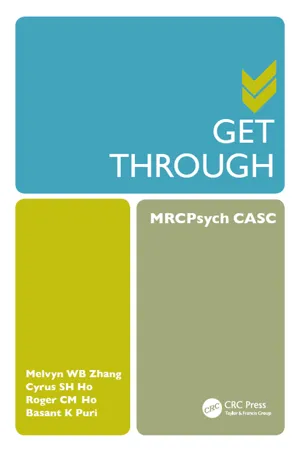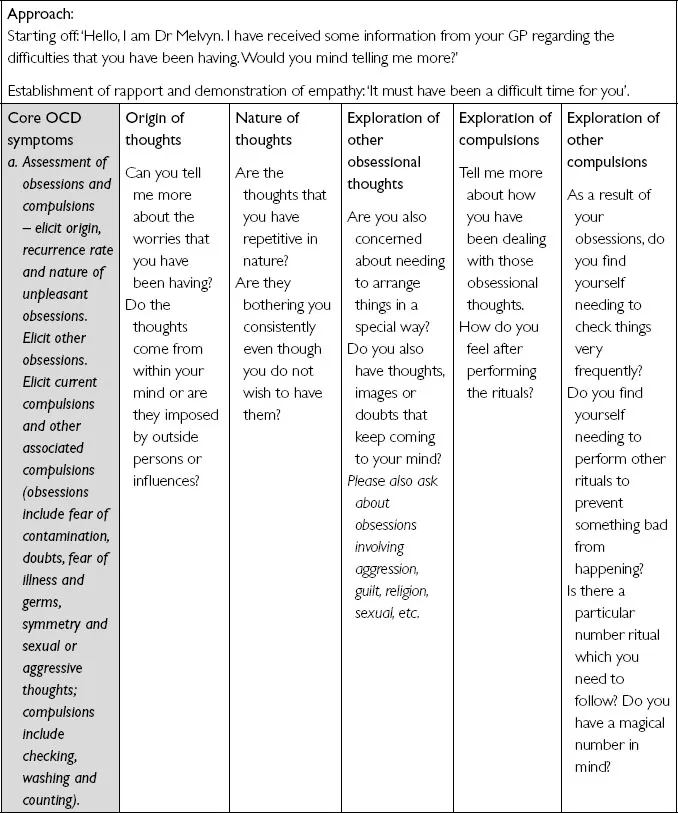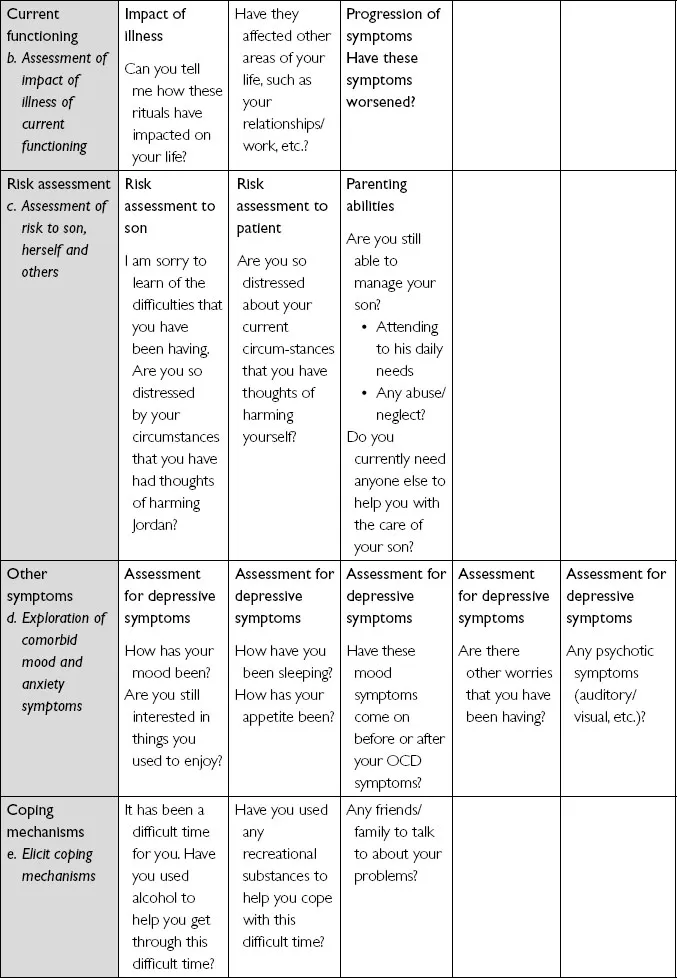
This is a test
- 470 pages
- English
- ePUB (mobile friendly)
- Available on iOS & Android
eBook - ePub
Get Through MRCPsych CASC
Book details
Book preview
Table of contents
Citations
About This Book
This book is intended for psychiatric trainees sitting the CASC component of the MRCPsych exam. Written by authors with recent exam experience and long-term expertise in the field, the text provides 175 stations closely matched to the subjects that appear in the actual exam, along with concise synopses and guidelines for how to target your revision to enable recall of the most relevant information.
Frequently asked questions
At the moment all of our mobile-responsive ePub books are available to download via the app. Most of our PDFs are also available to download and we're working on making the final remaining ones downloadable now. Learn more here.
Both plans give you full access to the library and all of Perlego’s features. The only differences are the price and subscription period: With the annual plan you’ll save around 30% compared to 12 months on the monthly plan.
We are an online textbook subscription service, where you can get access to an entire online library for less than the price of a single book per month. With over 1 million books across 1000+ topics, we’ve got you covered! Learn more here.
Look out for the read-aloud symbol on your next book to see if you can listen to it. The read-aloud tool reads text aloud for you, highlighting the text as it is being read. You can pause it, speed it up and slow it down. Learn more here.
Yes, you can access Get Through MRCPsych CASC by Melvyn Zhang Weibin, Cyrus Ho Su Hui, Roger Ho, Basant K. Puri in PDF and/or ePUB format, as well as other popular books in Medicine & Medical Theory, Practice & Reference. We have over one million books available in our catalogue for you to explore.
Information
TOPIC 1 GENERAL ADULT PSYCHIATRY |
STATION 1: ANXIETY DISORDERS
Information to candidates
Name of patient: Sarah Green
A 35-year-old housewife has been referred by her general practitioner (GP) to your service for further assessment. She has given birth to her son, Jordan, 6 weeks ago. She has been increasingly troubled by fears that Jordan might be infected with the new variant of the H1N1 influenza virus. Owing to her distressing worries, she has been finding it increasingly difficult to care for her young baby.
Task
Take a history to arrive at a potential diagnosis.
Outline of station
The purpose of providing an outline of the station is to allow candidates to be familiar with the structure of the station. This outline could also be helpful when candidates practice for the MRCPsych, joining with their colleagues to act out the station.
Please note that the outlines provided are based on the experiences of the authors. There may be variations in the actual examination.
You are Sarah Green and have just delivered your son, Jordan, 6 weeks ago. This is your first pregnancy. You used to have obsessive–compulsive disorder (OCD), which was first diagnosed by your GP when you were age 25. You have been treated with clomipramine previously, but this medication was stopped because of excessive sedation you had from the medication. You were switched over to sertraline and have been on a stable dose. This medication was stopped around 1 year ago, when your symptoms markedly improved after a combination treatment with medication (sertraline) and psychotherapy (exposure and response prevention). After the birth of your child, those symptoms reappeared. You are troubled by recurrent ruminations pertaining to fears of contamination. This has resulted in you having to sterilize the milk bottles of your infant a fixed number of times (eight times). In addition, you have begun to have obsessional doubts and realize that you need to check things (such as switches) eight times. Your mood has been affected by your symptoms, but you still struggle to get by each day. Your family has been largely supportive, and your husband has taken over much of the care of Jordan, as you have been finding it increasingly difficult to care for your child and to ensure that he is getting his feeds on time. You start off the station telling the candidate that your mood has not been good recently after the birth of the baby. Do not be too forthcoming about your personal psychiatric history unless the candidate demonstrates empathy towards your condition.
CASC construct table
The CASC construct table is formatted such that candidates will be able to cover adequately both the range and the depth of the assessment required in this station.


It is important to ask about the circumstances that led to onset of symptoms, previous psychiatric history and previous compliance to medications. It would also be pertinent to ask about the support given by family, possible stressors the patient faced and circumstances of pregnancy (planned/unplanned, support of husband, any problems with pregnancy).
Common pitfalls
a. Failure to demonstrate empathy towards the patient’s current difficulties hence leading to failure in eliciting core symptomatology
b. Failure to cover the range and depth of the OCD symptoms – need to elicit the inherent characteristics of ‘obsession’ and ‘compulsion’
c. Failure to perform a comprehensive risk assessment
Quick recall: OCD*
Epidemiology:
Lifetime prevalence of around 1.9%–3.0%.
Affects males and females equally.
Usual onset either between the age of 12 and 14 years or between the age of 20 and 22 years.
Diagnostic criteria (adapted from International Statistical Classification of Diseases and Related Health Problems, 10th revision [ICD-10])
a. The symptoms have to be present for at least 2 weeks in duration.
b. Obsessional symptoms are recognized as one’s own.
c. There must be at least one act or thought that cannot be resisted.
d. Thoughts of carrying out the compulsion are not pleasurable.
e. Thoughts, images and impulses are experienced as being unpleasant in nature.
f. There must be interference in existing functioning.
Most common obsessions (in descending order):
a. Fear of contamination
b. Doubting
c. Fear of illness, germs or bodily symptoms
d. Symmetry
e. Sexual or aggressive thoughts
Most common compulsions (in descending order):
a. Checking
b. Washing
c. Counting
Suggested References: NICE Guidelines for OCD and BDD: http://guidance.nice.org.uk/CG26; J.L. Kolada, R.C. Bland and S.C. Newman (1994). Obsessive-Compulsive disorder. Acta Psychiatr. Scand. (Suppl. 376): 24–35.
STATION 2: PSYCHOSIS
Information to candidates
Name of patient: John Smith
John Smith has been brought in to the hospital for an assessment today, as he went to the police and told them that he was surrendering for a terrible crime that he had committed. The medics have done basic blood and radiological investigations, and their findings indicated his physical health was normal. They have called you, the psychiatric trainee on call, to assess him.
Task
Perform a mental state examination (MSE), looking in particular for any delusional beliefs and any other psychopathology that he has.
Outline of station
You are John Smith, a 45-year-old postman. You surrendered yourself to the police today, as you firmly believe that you are totally responsible for the war that has occurred between Russia and Ukraine. You are extremely guilty for causing the war, as you feel that it is all because of a silly mistake which you made 3 months ago whilst sorting out the mails in the Royal Mail headquarters. It troubles you greatly when you see or hear of the death toll from the war. You decide to surrender yourself today as the police have been commenting and telling you that you should. Your mood is terrible, and you have been having poor sleep as the police keep speaking to you. You are e...
Table of contents
- Cover
- Half Title
- Title Page
- Copyright Page
- Table of Contents
- Preface
- Authors
- Topic 1 General Adult Psychiatry
- Topic 2 Physical Examinations
- Topic 3 Geriatric Psychiatry
- Topic 4 Child Psychiatry
- Topic 5 Learning Disabilities
- Topic 6 Addictions and Substance Misuse
- Topic 7 Psychotherapies
- Topic 8 Personality Disorder
- Topic 9 Eating Disorders
- Topic 10 Women’s Mental Health and Perinatal Psychiatry
- Topic 11 Consultation Liaison Psychiatry
- Topic 12 Forensic Psychiatry
- Topic 13 New Stations
- Index